Summary: This article gives 7 ways churches-especially Evangelical churches-can address emotional abuse in Christian marriages better. Then this article documents 7 problems and gives 7 solutions for pastors, church staff, and lay leaders. Here is the 20-min. video version on YouTube.
7 WAYS CHURCHES CAN GET BETTER
ABOUT HANDLING EMOTIONAL ABUSE VICTIMS
- 1. Learn to identify emotional abuse tactics. Many tactics are insidious and destructive yet difficult for outsiders to detect. Although some people may not take emotional abuse seriously, the legal world does. “Coercive control” is illegal in England, Scotland, Ireland, France, and Wales and in many U.S. states. Some emotional abuse falls within criminal definitions of threats (extortion), bribery, blackmail, perjury, harassment, and defamation. Read this list of 130 common examples of abuse. www.lifesavingdivorce.com/130examples
- 2. Help your staff create a plan when you hear about emotional abuse. Educate them about the realities of abuse in Christian homes. Even the most conservative family researchers writing for the pro-marriage Institute for Family Studies have found than 1-in-4 highly religious marriages in the U.S. have experienced abuse (page 31). Hold a basic Domestic Violence 101 training for church staff and volunteers. Pastor Neil Schori’s 1-hour video training is free: www.lifesavingdivorce.com/DVOctober
- 3. Understand that abuse victims don’t always know they are being abused. They may even deny being abused, even if they are being battered. Show them the Duluth Wheel of Power and Control, a circular diagram available free online that describes 8 categories of abuse and give examples.
- 4. Investigate the Bible passages about abuse and divorce www.LifeSavingDivorce.com/abuse-in-bible
- 5. Reframe Malachi 2:16 in your sermons. For the majority of biblical and church history, Malachi 2:16 was not translated as “God hates divorce” or “I hate divorce.” It was written more than 2,400 years ago. For the first 2,100 years, it was interpreted as an anti-abuse or anti-treachery verse, rather than an anti-divorce verse. Then, starting for the first time with the King James Version, for 385 years, it was interpreted as “God hates divorce.” Now the new modern translations published since 1996 (after the Dead Sea scroll fragment of Malachi 2:16 was published) have gone back to the interpretation used prior to 1611 and the KJV. The NIV 2011, ESV, and CSB do not interpret it as “God hates divorce.” Graphic: Malachi Time Line: www.LifeSavingDivorce.com/malachitimeline To see major Bible translations for the past 2,400 years, click www.lifesavingdivorce.com/malachi
- 6. Include in sermons that emotional abuse is real, give examples and tell victims it isn’t right. Empower them to speak up. See www.LifeSavingDivorce.com/130examples
- 7. Publicly admit that some divorce is justified and godly. It’s God’s rescue plan to save the lives of parents and children. To defend this viewpoint, refer to the findings in the Harvard Quarterly Journal of Economics that found that in states that passed unilateral no-fault divorce in the 1970s and 1980s, the suicide rate for wives dropped 8-16%. The domestic violence rate by and against both men and women dropped 30%. The homicide rate of women murdered by an intimate dropped 10%. (Source: Stevenson and Wolfers, “Bargaining in the Shadow of the Law: Divorce Laws and Family Distress,” The Quarterly Journal of Economics (Feb. 2006).)
NEXT STEP
Twenty-five years ago, I was a young divorced mother in the mega-church I had attended since childhood. I knew perhaps a dozen people who had ever gone through a divorce, despite the fact that 1-in-4 conservative Christians have ever divorced according to Barna Group. In a church of more than 2,000 adults, demographers would have expected about 500 divorcees. But I didn’t see them. I had been attending that church for nearly 30 years but only knew a handful of members who had ever divorced. They either weren’t there, or they were hiding, trying to avoid the stigma. Now I believe many had left and gone elsewhere. LifeWay reports that 1 in 5 Christian divorcees leave the church and about half switch churches. Christianity Today reports a huge drop-off of Evangelical divorcee attendance-perhaps 1 in 3-far worse than other kinds of churches see. Evangelical divorcees leave, but not necessarily because they’ve rejected their faith. Many still love the Lord, and identify as Evangelicals, but don’t feel accepted and valued in the church. (See graph below, from the Christianity Today article.) Thousands have found faith communities in secret online support groups on Facebook and elsewhere.

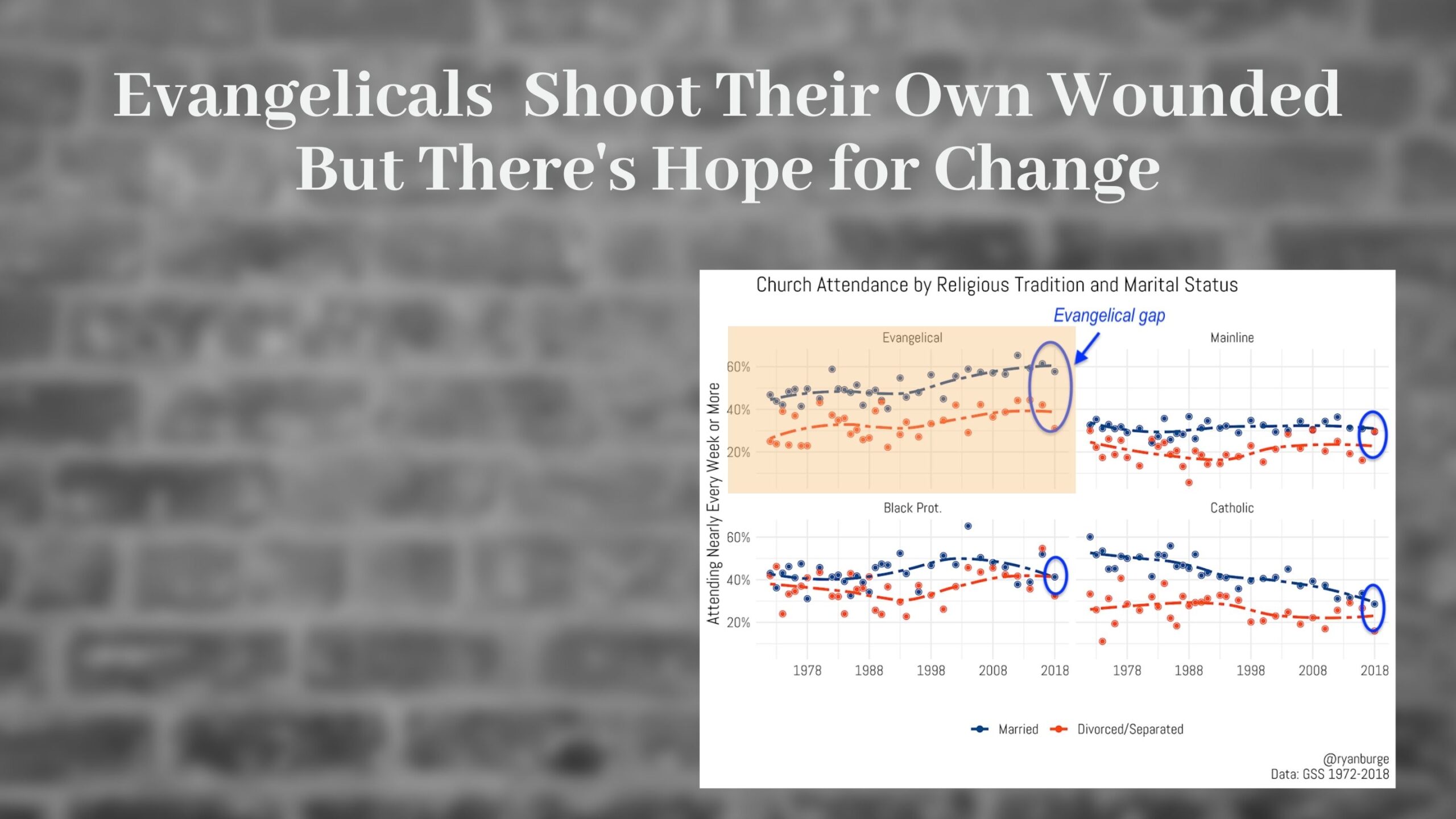
7 PROBLEMS TO SOLVE IN OUR CHURCHES

1. WHEN A CHRISTIAN MARRIAGE HAS TROUBLE, MANY EVANGELICALS ASSUME THE PROBLEMS AREN’T ALL THAT BAD
We tell the upset injured spouse:
-to try harder, pray more, be more agreeable.
-the prayers of a righteous spouse will fix it.
-their godly example will inspire the abuser to change.
We believe this so much, many Christian cannot face the reality that you can pray and fast and submit and be more agreeable, and your marriage may still be destructive.
As we all know abusers, cheaters, and addicts love their lives exactly as it is. They may shed tears and say they’ve repented, but they have the perfect life. They enjoy being selfish, rude, deceptive or indifferent and still having a wife who serves hot meals, provides a warm bed, cares for the kids, and gets the bills paid. What more could a self-centered person want!
Yet we pressure and blame the injured wife, and in doing so, actually side with the abuser. (I run a ministry for abused wives and husbands, so I know it can be the man who’s the victim.)

2. MANY EVANGELICAL BOOKS IGNORE ABUSE
For example, one of the bestselling premarital workbooks, Before You Say “I Do,” by Dr. Norm Wright
This is the premarital workbook, my ex and I went through 35 years ago before we got married. I divorced him a decade later due to his sexual immorality and illegal behavior.
A few years ago, I found the workbook in an old box. I wanted to read it and see how I and my ex-husband had answered the questions. I was surprised to find that all of our answers were honest. The problem was that this workbook never brought up any difficult topics.
The words adultery, lying, cheating, betrayal, gambling, pornography, and addiction didn’t appear in this bestselling workbook. (They still don’t. I bought the newest version as a comparison.)
Nor do the words abuse, slap, hit, push, or fight.
This workbook naively assumes two Christians have the other’s best interest at heart. It never brings up sinful behaviors: abuse, adultery, prostitution, chronic lying, drug addiction, gambling, battering, child sexual abuse, or other behaviors that would destroy the trust in a marriage and jeopardize its future. [Click link for my full book review of Before You Say “I Do.”]
This is a feature of Evangelicalism, not a bug. We just don’t want to talk about it. As Dr. Nancy Nason-Clark, a researcher on domestic violence in the church wrote:
The Battered Wife: How Christians Confront Family Violence

3. PRETENDING IT DOESN’T EXIST HARMS ABUSE VICTIMS
So what do we Christians do? We minimize it. We pretend it doesn’t exist. Or if it does exist, it either rare in Christian homes, or it’s really not all that bad. We convince the victim it doesn’t exist. We tell the victim they are overreacting or being too sensitive, that these are all normal marriage problems. And they aren’t. No good pastor would treat his wife this way. This is what drives abuse victims out the door.
Physical and emotional abuse are real. Emotional abuse destroys people just as surely as physical abuse does, some would argue even more!

4. DIVORCE IN THE BIBLE CAN BE EITHER JUST OR UNJUST
- Here’s another factor: We’ve made divorce the worst possible sin. But the Bible doesn’t. It’s not in any list of sins in the Bible. The Bible talks about just and unjust divorce. In three places people are commanded to divorce. (Ex 21:10-11; Deut. 21:10-14; Ezra 9-10) to end either physical, emotional, or spiritual abuse.
- There is nuance in the Bible about divorce.
In my home church, I heard a sermon that said, “If you walk away from your marriage, you’re walking away from Jesus.” Really? That would mean if you divorce, you’ve rejected Christ and you’re no longer a Christian.
I switched churches due to their rhetoric that demeaned divorcees and mocked us.

5. CHRISTIANS NEED ACCURATE INFORMATION ABOUT DIVORCE, BUT AREN’T GETTING IT
One young pastor at the mega-church I attended preached this over and over: “Divorce never makes anything better; it just gives you different problems.” The tone-deafness of that statement is unbelievable. I’ll bet that pastor has never taken the time to listen to a grateful divorcee who escaped a 10-, 20-, 30-, or 40-year abusive marriage.
Half of divorces in the U.S. are for very serious reasons:
- sexual immorality
- physical abuse
- emotional abuse
- life-altering addictions
- severe indifference or neglect
…and a lot of those horrible reasons go away when you divorce.
Sure, divorcees need two years on average to get back on their feet and go back to their normal level of happiness, but the truth is they are likely to be better off, with greater health and wellbeing on average. More than 8 in 10 of the divorced/separated women and men in my private Christian Facebook group say their health has improved since they divorce.

6. EVANGELICALS ARE TOLD DIVORCE UNIVERSALLY DESTROYS KIDS. IT DOESN’T.
Misleading articles about negative outcomes of children and divorce pervade Evangelical spaces. The misinformation keeps abuse victims from getting the life-saving separation or divorce they need.
The truth is simple, and it’s been verified repeatedly by many family sociologists:
-8 in 10 kids of divorce turn out fine, with no serious longterm emotional, psychological or social problems.
-If the marriage is bad, divorce is likely good for kids. If the marriage is good, divorce is bad for kids.
-Many Evangelical websites mischaracterize the conclusions of the very researchers they quote. Carelessness? Fraud? You decide.
How do I know? I took the time to read the researchers’ studies and books. It’s shocking to me how Christian leaders and radio ministries will grab one quote about how bad divorce is and miss a major quote in the same study or book about how important it is to get kids out of emotionally or physically abusive or high-conflict homes. Often these statements are right in the introductory abstract or in the discussion (the conclusion) at the end. At first, I thought it was carelessness. They just missed the quote. But now I realize it happens every time. We are being systematically lied to. These organizations are either grossly negligent or they want to mislead us in order to demonize divorce. Whenever you hear of someone claiming that divorce universally destroys kids, look at the actual study. Nine times in ten, you’ll also discover a quote saying it’s likely better to divorce were there’s a toxic environment. We’re been misled.:

7. DIVORCE SAVES LIVES
When “no fault” divorce laws started passing one state at a time,
starting with Governor Ronald Reagan in California in 1969, family researchers wanted to see the effect.
-In states that passed unilateral no-fault divorce, they observed the suicide rate for wives drop 8-16%.
-The domestic violence rate by and against both men and women dropped 30%.
-The homicide rate of women murdered by an intimate dropped 10%.
(Stevenson and Wolfers, “Bargaining in the Shadow of the Law: Divorce Laws and Family Distress,” The Quarterly Journal of Economics (Feb. 2006): 267, 286.)
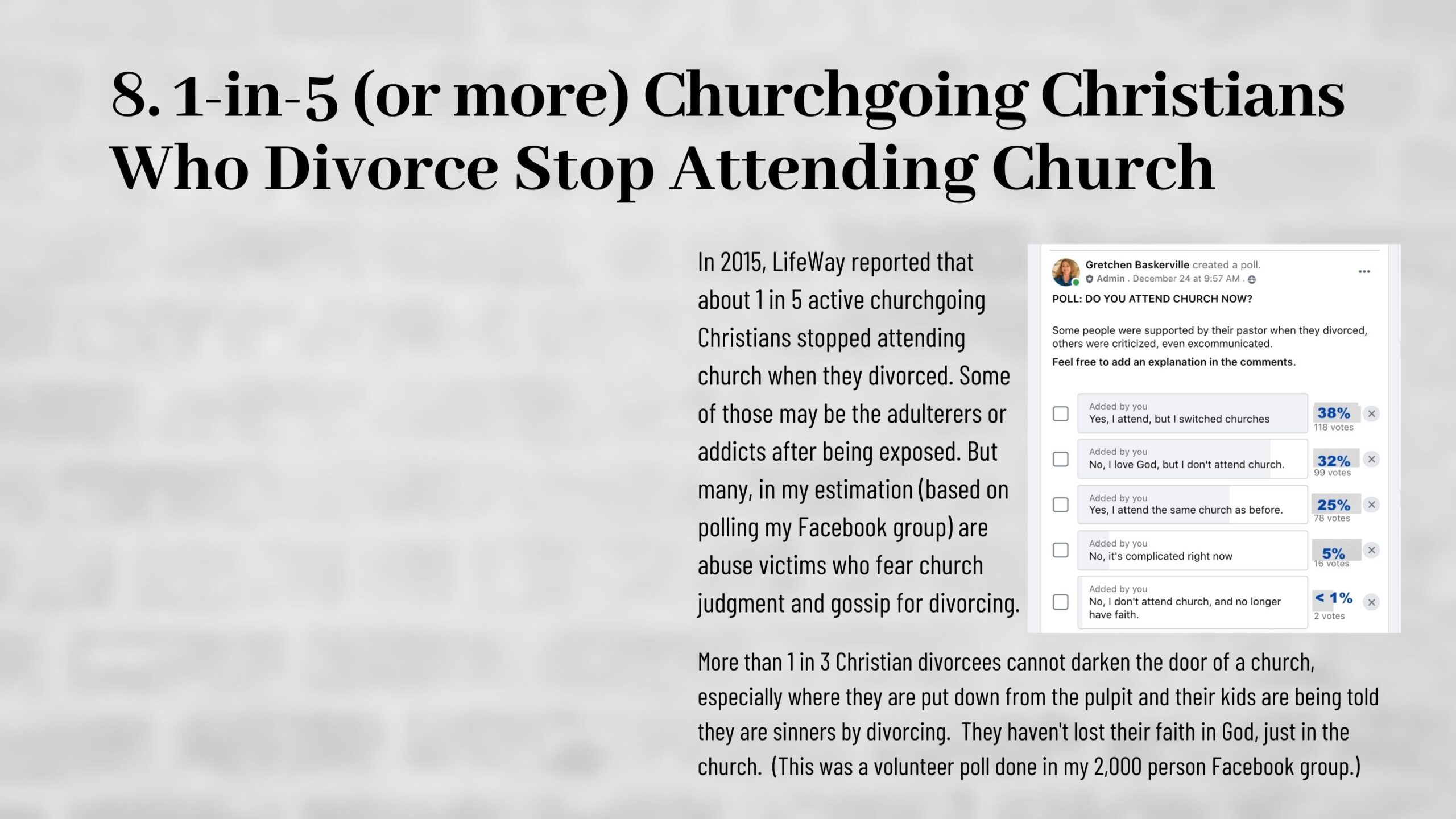
8. 1-in-5 (or more) Churchgoing Christians Who Divorce Stop Attending Church
In 2015, LifeWay reported that about 1 in 5 active churchgoing Christians stopped attending church when they divorced. Some of those may be the adulterers or addicts after being exposed. But many, in my estimation (based on polling my Facebook group) are abuse victims who fear church judgment and gossip for divorcing.
In my polls of self-selected volunteers from my 2,000 member private group, I found that more than 1 in 3 Christian divorcees no longer attend church, especially churches where they are demeaned from the pulpit and their kids are being told in Sunday school their parent is a sinner by filing for divorce. These people haven’t lost their faith in God, just in the church. Or as we say, “They divorce their abusive ex, and their abusive church.”
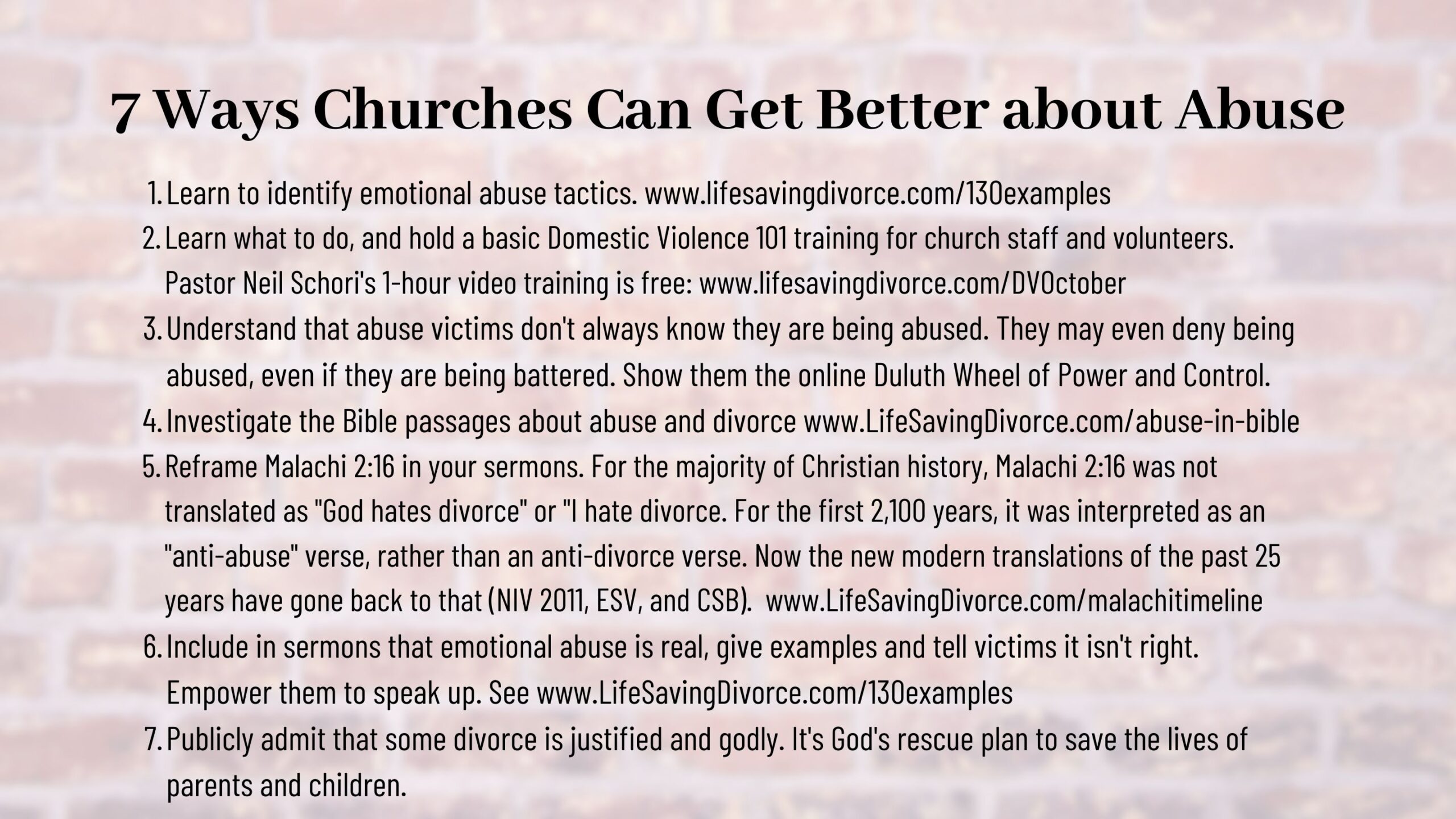
7 WAYS CHURCHES CAN GET BETTER
ABOUT HANDLING ABUSE VICTIMS
- 1. Learn to identify emotional abuse tactics. www.lifesavingdivorce.com/130examples
- 2. Learn what to do, and hold a basic Domestic Violence 101 training for church staff and volunteers. Pastor Neil Schori’s 1-hour video training is free: www.lifesavingdivorce.com/DVOctober
- 3. Understand that abuse victims don’t always know they are being abused. They may even deny being abused, even if they are being battered. Show them the online Duluth Wheel of Power and Control.
- 4. Investigate the Bible passages about abuse and divorce www.LifeSavingDivorce.com/abuse-in-bible
- 5. Reframe Malachi 2:16 in your sermons. For the majority of Christian history, Malachi 2:16 was not translated as “God hates divorce” or “I hate divorce. For the first 2,100 years, it was interpreted as an “anti-abuse” verse, rather than an anti-divorce verse. Now the new modern translations of the past 25 years have gone back to that (NIV 2011, ESV, and CSB). www.LifeSavingDivorce.com/malachitimeline
- 6. Include in sermons that emotional abuse is real, give examples and tell victims it isn’t right. Empower them to speak up. See www.LifeSavingDivorce.com/130examples
- 7. Publicly admit that some divorce is justified and godly. It’s God’s rescue plan to save the lives of parents and children.
If the church doesn’t change its mindset, Christian abuse victims will find help online. Internet support groups and faith communities for Christians who needed life-saving divorces are exploding. As the leader of one of these groups, believe me, I’d love it if people could find acceptance and close friendships and an opportunity to serve in their local church, but 4 in 10 cannot.
Are you going through a life-saving divorce? I’d like to invite you to my private Facebook group, “Life-Saving Divorce for Separated or Divorced Christians.” Just click the link and ANSWER the 3 QUESTIONS. This is a group for women and men of faith who have walked this path, or are considering it. Also, sign up for my email list below.
- What is a Life-Saving Divorce? How Do We Know Half of Divorces are “Life-Saving”? (or watch the video)
- Life-Saving Divorce: Introduction What Is this Book About? (audio and transcript)
- About Me: Why Is a Nice Christian Girl Like Me Promoting Divorce?
- How Can I Get the Book, The Life-Saving Divorce? (Amazon affiliate link.) – FREE study guides for each chapter. – FREE videos for each chapter.
- 130 Examples of Abuse: Emotional, Physical, Financial, Spiritual and Gaslighting
- Abuse is Biblical Grounds for Divorce
- “But He Never Hit Me”: Divorce for Neglect, Emotional, and Financial Abuseå
- Pastors Who Accept Physical and Emotional Abuse as Grounds for Divorce
- Severe Emotional Neglect: Toni’s Story of Finding Freedom (video)
- 40 Years of Murderous Rages and How I Got Free! Karen’s story (video)
- How Churches Should Handle Abuse Victims (video with Pastor Neil Schori)
- Help! I’m Married to a Cheater: Should I Stay or Go?
- Married to a Pedophile: How I Got Out – Pam’s Story (video)
- Help! I Am Alone with the Abuser
- Jesus’ Greatest Divorce Sermon – Luke 13 (or watch the Video)
- Pastors Who Accept Physical and Emotional Abuse as Grounds for Divorce
- Myth: The Person Who Files for Divorce Caused the Divorce
- Haven’t Our English Bibles Always Said, “God hates divorce”? No.
- Jesus Said, “Love My Enemy”-Can I Still Divorce Them?
- But I Thought it Was God’s Will for Me to Marry this Person!
- Is Pointing Out Marriage-Endangering Sin Being Judgmental? (video)
- One Woman’s Story: Adultery, Prayer and the Bible
- Is Marriage an Unconditional Covenant or a Conditional One? (Video)
- Does Divorce Shatter the Image of Christ and the Church as John Piper Suggests?
- Divorce and the Good Samaritan Story
- Myth: Divorce is the Unpardonable Sin and “God Hates Divorce”
- Myth: Your Divorce Will Shatter the Image of Christ and the Church
- Myth: You Must Forgive and Forget Over and Over, Forever
- Malachi 2:16 Haven’t Our English Bibles Always Said, “God hates divorce”? No.
- Myth: Divorce is the Unpardonable Sin and “God Hates Divorce”
- List of Every Known Puritan Divorce in Massachusetts between 1639 and 1692.
How to Find a Good Supportive Church
- Pastors Who Accept Physical and Emotional Abuse as Grounds for Divorce
- 7 Ways to Know if a Church is Safe for Abused Wives (or Abused Husbands)
- Do My Pastors Have a Say about Me Getting a Divorce?
- Good vs. Bad Pastoral Counselors on the Topic of Marital Abuse: 40 People Tell their Stories
- 5 Bible Verses that Say You Should Separate from an Abuser
- 1 Million God-honoring Divorcees Cannot Find a Good Church
- Church Denominations and Divorce Policies Comparison Chart
- Excommunication for Getting Divorced? What to Do!
- Evangelicals Shooting their Own Wounded Divorcees (video) or blog/transcript
- How to Handle Criticism When You Divorce (video-3 parts) Natalie Hoffman, Gina Kaye
- Myth: You Don’t Take God-Ordained Marriage Seriously
- Sermon Ideas for Domestic Violence Awareness Month – October
- Churches That Block Abused Wives (and Husbands) From Divorcing
- Southern Baptists make Evangelicalism Unsafe for Abused Wives & Husbands
- How Churches Should Handle Abuse Victims (video with Pastor Neil Schori)
- Your Kids Will Likely Be Fine After Divorce (Nearly 8 in 10 Are!)
- 10 Facts Evangelical Pastors MUST Know about Kids and Divorce [VIDEO]
- There Is No Divorce Crisis. We have a Sin Crisis.
- Myth: 95% of Divorces are for Falling Out of Love
- Will I Ever Find Love Again?
- Dating after Divorce: An interview with Gina Kaye
- I Fear I’ll Never Find a Healthy Relationship
- Remarriage after Divorce: How Can I Claim to be the Innocent Spouse? I Had My Faults Too!
- Will the Kids and I Ever Be Happy Again?
- Happiness Either Way: Remarriage or Staying Single
- Divorce May Improve Your Health: Depression, Suicidal Thoughts and Medical Issues
- How My Health Improved Dramatically After Divorce: Karen’s Story (video)
- “I’m Off of All My Depression Medications Now That I’ve Divorced” Schari’s story (video)
- PTSD, EMDR and My Major Health Improvements after Divorce Toni’s story (video)
- Christians Finding Peace after Divorce: Shirley Fessel, Author (Audio) or (Video)
- 10 Turning Points: Stories of How Others Decided to Stay or to Go
- Married to a Pedophile: How My Kids and I Got Free! (video)
- Finding Joy after a 40-Year Abusive Marriage (video)
- Can I Divorce My Mentally Ill, Destructive Spouse? Yes! Amanda’s Story (video)
- From Bondage to Glorifying God! 5 Survivor Stories (after 20-, 30-, 40-year long abusive marriages)
Self-Doubt, Second-Guessing Ourselves, and Gaslighting
- Am I the One Destroying the Relationship?
- How Can I Call Myself the Innocent Spouse? I Wasn’t Perfect Either (video)
- Is Pointing Out Marriage-Endangering Sin Being Judgmental? (video)
- Myth: He Wouldn’t Cheat or Watch Porn if You Gave Him More Sex
- Myth: You’re Lying: We’d All Know If Your Spouse Was That Bad
- Myth: It Takes “Two to Tango” and “All Marriage Problems are 50/50”
- How to Handle Criticism When You Divorce (video-3 parts) Natalie Hoffman, Gina Kaye
- Is it Best to “Stay for the Kids”? Sometimes, yes. But Not if It’s a Toxic Marriage
- Researchers Know Your Kids Will Likely Be Fine After Life-Saving Divorce
- 5 Studies That Say Your Kids are Likely to Be Okay After Divorce (video)
- Marriage Does Not Guarantee Good Kids: 1 in 10 Kids from Married Two-Parent Homes are Troubled.
- Myth 21: Divorce will Destroy Your Children, So Stay for the Sake of Your Kids
- Research shows: Your Kids Will Likely Be Fine After Divorce: In Fact It’s Best to Divorce to Get Away From Abuse
- 12 Ways to Document and Protect Yourself in a High-Conflict Divorce
- 12 Tips for Talking with Angry, Alienated Kids
- Myth: Divorce will Destroy Your Children, So Stay for the Sake of Your Kids
- Myth: Your Marriage Would Be Great if You Just Submitted More
- Myth: Divorce will Destroy Your Children, So Stay for the Sake of Your Kids
- Myth: Divorce is the Unpardonable Sin and “God Hates Divorce”
- Myth: You Just Didn’t Try Hard Enough
- Myth: You Don’t Take God-Ordained Marriage Seriously
- Myth: Your Divorce Will Shatter the Image of Christ and the Church
- Myth: You Must Forgive and Forget Over and Over, Forever
- Myth: 95% of Divorces are for Falling Out of Love
- 27 Myths about Divorce That Probably Don’t Apply to Committed Christians
- Download “7 Effective Ways to End the Stigma of Divorce in the Church” (Sign up)
- Download “7 Effective Ways to Deal with Criticism when You Divorce” (Sign up)
- Download “3 Studies that Show Kids Are Most Likely to Turn Out Fine After Divorce” (Sign up at bottom of page)
- Home Follow me on Facebook • Follow me on Twitter • Buy the book.
- 10 Key Highlights from the The Life-Saving Divorcebook: 10-minute video overview OR 10 Key highlights blog post
- Request to Join the Life-Saving Divorce Private Facebook Group (Don’t forget to answer the 3 questions)
- Subscribe (FREE) to my You Tube Channel
- About Me Contact
- Gretchen’s Life-Saving Divorce Interviews in the Media

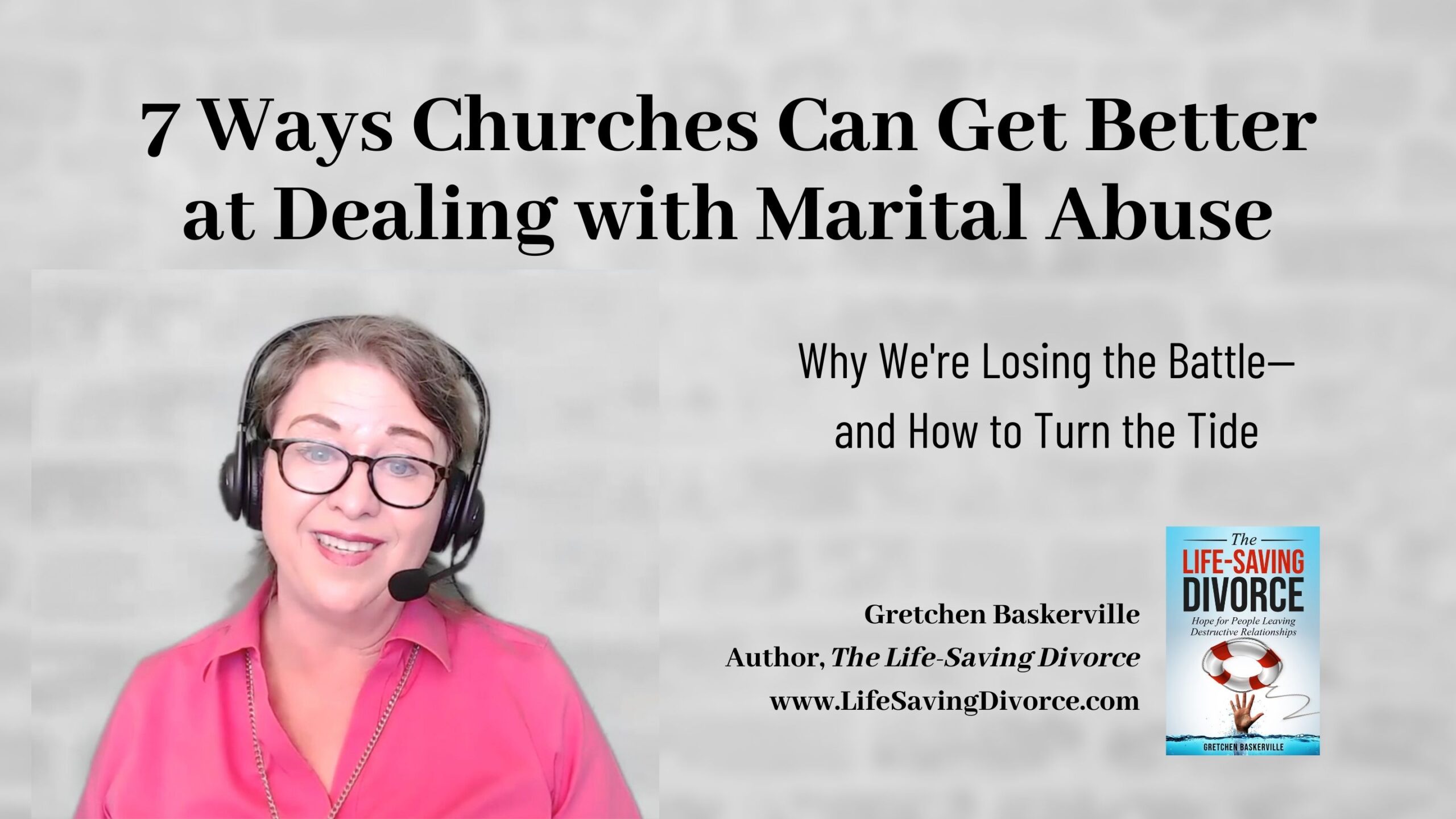
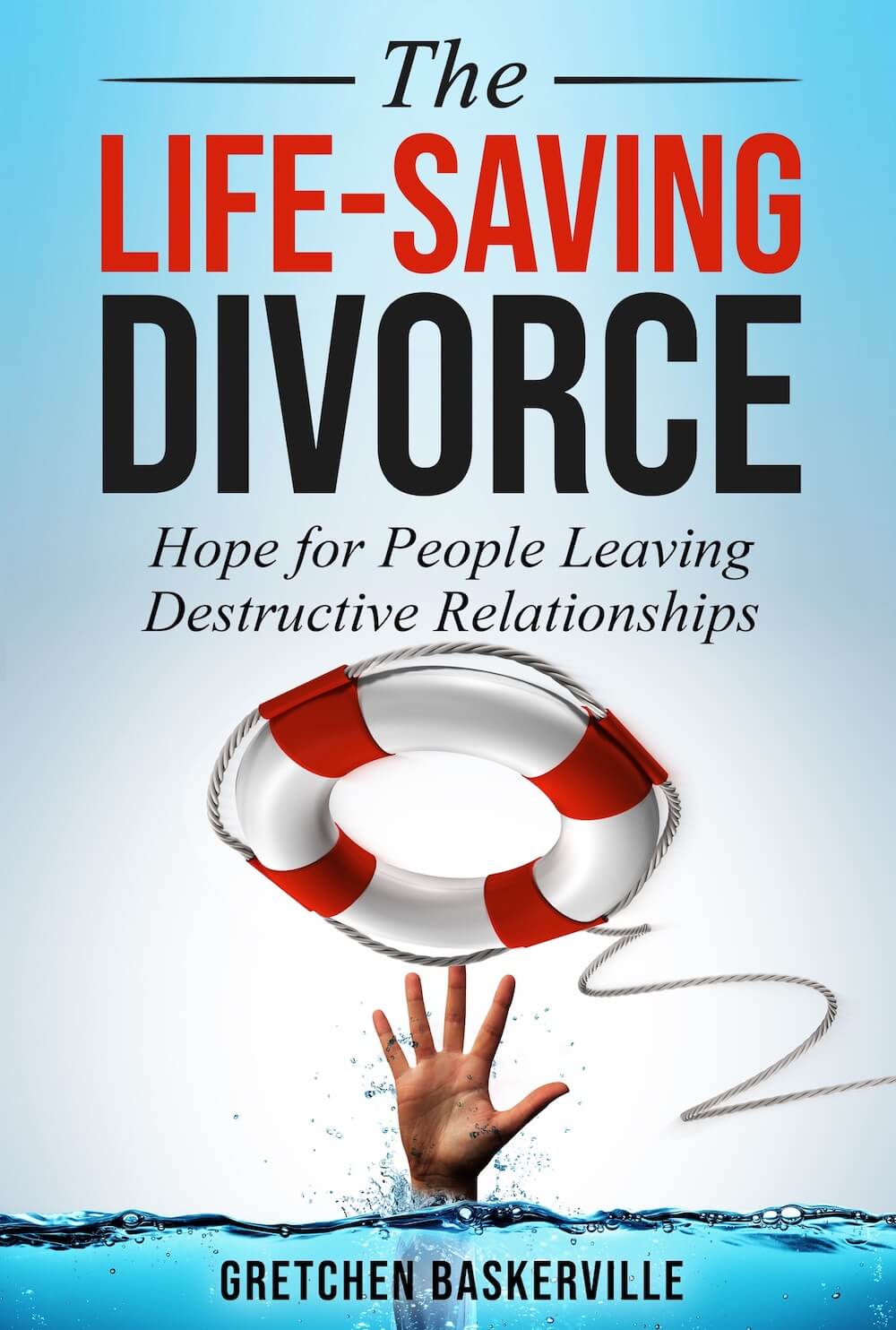
 :
:
 Buy PDF
Buy PDF